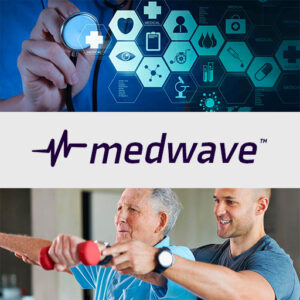
Remote Therapeutic Monitoring (RTM) is a digital health solution that enables healthcare providers to monitor non-physiological data related to therapeutic adherence, response, and functional status. Unlike Remote Patient Monitoring (RPM) which focuses on physiological data, RTM tracks metrics such as therapy adherence, medication response, pain levels, respiratory status, and musculoskeletal system status outside of traditional clinical settings.
Remote Therapeutic Monitoring (RTM) Benefits
RTM has emerged as a valuable tool for healthcare providers, particularly those in physical therapy, occupational therapy, and respiratory therapy.
There are significant potential benefits to RTM including:
- Enhanced therapy outcomes: Regular monitoring of therapeutic progress and adherence enables providers to adjust treatment plans promptly and ensure optimal results.
- Improved patient compliance: Digital tracking and feedback help patients stay engaged with their therapy regimens and medication schedules.
- Better resource utilization: Providers can focus in-person visits on patients who need them most while maintaining oversight of others remotely.
- Data-driven care decisions: Continuous monitoring of therapeutic responses allows for more informed adjustments to treatment plans.
While RTM offers numerous advantages, proper billing and documentation are crucial for reimbursement. This guide covers RTM billing, including coding, eligibility, reimbursement, and compliance considerations.
CPT Codes for RTM Services
The main Current Procedural Terminology (CPT) codes for RTM billing are:
98975
Initial set-up and patient education for monitoring equipment. This code covers the initial setup, patient education, and device provision for therapeutic monitoring. It can be billed once per episode of care.
98976
Device supply with scheduled recordings and/or programmed alerts transmission for monitoring musculoskeletal system status, each 30 days.
98977
Device supply with scheduled recordings and/or programmed alerts transmission for monitoring respiratory system status, each 30 days.
98980
Remote therapeutic monitoring treatment management services, first 20 minutes of clinical staff/physician/other qualified healthcare professional time in a calendar month requiring interactive communication with the patient/caregiver.
98981
Remote therapeutic monitoring treatment management services, each additional 20 minutes of clinical staff/physician/other qualified healthcare professional time in a calendar month.
Billing Requirements
Specific billing rules and documentation must be followed for RTM reimbursement:
- Patient consent: Obtain and document written or verbal consent for RTM services before billing
- Medical necessity: Document the therapeutic need for RTM based on the patient’s condition
- Initial evaluation: Perform and document an initial assessment to establish the need for therapeutic monitoring
- Interactive communication: For codes 98980 and 98981, provide direct, two-way interaction between provider and patient
- Time tracking: Document at least 20 minutes of interactive communication monthly for 98980, with additional time billed under 98981
- Diagnosis codes: Include appropriate ICD-10 codes reflecting the conditions requiring therapeutic monitoring
- Medical records: Maintain detailed documentation of monitoring parameters, communication, and therapeutic progress
Eligible Practitioners and Services
RTM services can be provided by a broader range of practitioners compared to RPM:
Eligible practitioners include:
- Physical therapists
- Occupational therapists
- Speech-language pathologists
- Respiratory therapists
- Physicians
- Qualified healthcare professionals
RTM services typically include:
- Device setup and education
- Monitoring of therapeutic adherence
- Assessment of therapy response
- Pain level monitoring
- Respiratory function tracking
- Musculoskeletal system monitoring
- Treatment plan adjustments
- Patient education and coaching
Reimbursement Considerations
RTM reimbursement varies by payer and continues to evolve:
Medicare
- Covers therapeutic monitoring for specific conditions
- Requires documented medical necessity
- Allows billing by qualified therapy providers
- Different requirements than RPM for time and communication
Commercial Insurance
- Coverage policies vary significantly
- May require prior authorization
- Different documentation requirements
- Varying reimbursement rates
Medicaid
- Limited coverage in most states
- Requirements vary by state
- May require specific provider credentials
- Different documentation standards
Compliance Considerations
RTM must comply with healthcare regulations including:
HIPAA
- Ensure secure transmission of therapeutic data
- Maintain patient privacy
- Use compliant communication platforms
Documentation Requirements
- Accurate time tracking
- Proper coding
- Medical necessity documentation
- Treatment plan integration
Specific RTM compliance areas:
Quality of Care
- Establish clear therapeutic goals
- Document progress and outcomes
- Maintain appropriate oversight
- Adjust treatment plans as needed
Technology Standards
- Use approved monitoring devices
- Ensure data accuracy
- Maintain system security
- Regular calibration and maintenance
Professional Standards
- Practice within scope
- Maintain required credentials
- Follow clinical guidelines
- Document appropriately
RTM offers significant opportunities to enhance therapeutic care through technology-enabled monitoring and management. Success requires careful attention to billing requirements, documentation standards, and compliance guidelines. Providers should establish clear protocols for RTM implementation while ensuring all regulatory and reimbursement requirements are met.
Summary: Remote Therapeutic Monitoring Billing, Credentialing
 At Medwave, we stand out in RTM billing through our end-to-end automation of the entire therapeutic monitoring reimbursement process.
At Medwave, we stand out in RTM billing through our end-to-end automation of the entire therapeutic monitoring reimbursement process.
Our platform seamlessly tracks the required 20-minute monthly interactive communication periods for CPT codes 98980 and 98981, while automatically documenting therapeutic parameters like pain levels, medication adherence, and functional status. Our system’s intelligent workflows ensure proper sequencing of RTM codes 98975-98977 for device setup and monitoring, and it maintains meticulous documentation of medical necessity and patient consent.
